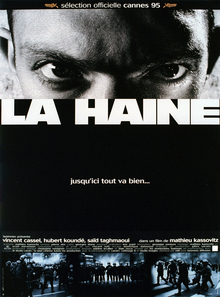
In this piece I will be comparing La Haine a 1995 film
directed and co-edited by Mathieu Kassovitz and City of god a 2002 film
directed by Fernando Meirelles and Katia Lund. I will be discussing themes and
the similarities and differences between how they are portrayed.
One main theme discussed in both films is police brutality.
Both of these films show how different races are treated by the police by they
are shown in very different ways. In La Haine the police are shown to be against
different races as it is set in Paris, France which is predominantly a white
area. With the three protagonists in La Haine being of different ethnicity’s;
Jewish, Arab and Black it is shown how they struggle to live with their lives whilst
constantly having the police on their backs watching what they do. The theme of
police brutality vs race is more evident in other films like La Haine such as
Spike Lee’s 1989 Do The Right Thing.
This theme is also shown within City Of God however because
it’s set in Rio, Brazil the police brutality doesn’t surround race but it more
so surrounds class. The film is set in the poorer areas of Brazil where the
easiest way to make money is through crime, the protagonist in this is poor and
lives his life surrounded by others thieving and selling drugs in order to make
a living. This is shown when Li’l Ze is walking with his gang and has a
shootout with the police. The police constantly keep watch on the town because
of this but don’t take much time to find out who has really done right or
wrong. I think the police brutality is La Haine follows a more serious issue
because of the discrimination of race that still links to the murders that are
happening in the world today. Class is still shown in La Haine however on
particular scene this is evident is when the three protagonists Vinz, Hubert
and Said are sitting in a children’s playground are a news reporter and her
cameraman come to talk to the boys about the riots that previously happened.
Rather than joining them in the playground they simply look over the railings in
the “pit” the park sits in showing the power and dominance the reporter has over
the boys, it’s almost as if she’s looking in to an animal pen at a zoo.
Another theme that occurs in both films that links to police
brutality is pride. In both films the characters they follow do not want to lose
their pride and give in to the police. In
La Haine Vinz is the character who portrays pride, his pride is firstly
described by a metaphor when and old man tells them a story in the toilets. The
man goes on to tell a story about one of his friends Grunwalski. The Grunwalski
story mimics our characters. In their situation they "miss the train"
when (SPOILER) - Vinz gets shot, Grunwalski continuously reaches for the train
but cannot reach because he tries to maintain his pride and keep his trousers
up. The hand represents Vinz's quest for racial equality and an end to police
brutality but he cannot reach them because he won't let go of his pride and
co-operate with the police. In City Of God however Li’l Ze is trying to keep
his pride by staying the “top dog” in the drug business by destroying all his
competitors and still escaping from the police. He tries to keep his pride and
reputation by not letting his competitors get away.
The theme of
masculinity also falls into this struggle for pride and reputation. This theme
is mostly recognisable in City Of God because all the men in the drug business
want to be the best and climb their way to the top defeating all competitors.
Masculinity is incredibly evident when a young boy goes for help hoping he can
help him get revenge for his father as he says “Kid? I smoke, I snort. I’ve
killed and robbed. I’m a man” this conveys how committing crimes is all the
young children see and think it’s the right thing to do if you want to grow up
and become something better; a man. Rocket the centre protagonist also wants to
show his masculinity through losing his virginity as if you become a man after
having sexual relations. Masculinity is also a theme in La Haine but is not so frequent
the main person who wants to be seen as masculine is Vinz who thinks he’s tough
and brave after getting a gun, two both very stereotypical traits of becoming a
man.
No comments:
Post a Comment